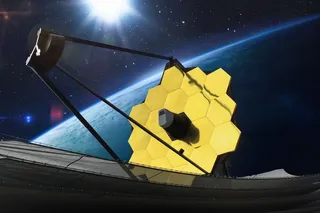A new plastic skin that could protect satellites from both searing and freezing temperatures in space could allow for a new generation of miniature spacecraft, researchers announced yesterday. Satellite designers had hit a wall in the quest to create tiny "micro-spacecraft" that weigh no more than 50 pounds because the temperature controls used on conventional satellites can't be scaled down. Lead researcher Prasanna Chandrasekhar says the development could allow small companies to send up individual satellites that better suit their needs rather than sharing space on one large one. As might be expected, the technology also has some other potential uses:
"For the military, undetectability is also important, either for surveillance applications or when it comes to zapping other satellites," Chandrasekhar added. "And when it comes to a [nano-spacecraft] less than 5 kilograms (10 pounds), you can't really detect it unless it's within a quarter of a mile of you. ...













